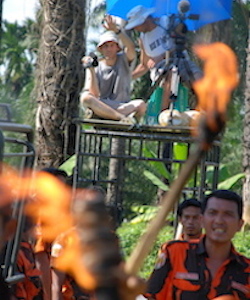Perhaps one of the most radical nominees for an Academy Award for Best Documentary ever—presented here in its revealing 159-minute director’s cut—The Act of Killing takes an innovative and willfully unnerving approach to the murderous legacy of Indonesia. Government-sanctioned purges meet Hollywood phantasmagoria in the film’s plunge into the genocidal imagination, as the comfortably middle-aged perpetrators of the original crimes—self-proclaimed “gangsters”—participate in bizarre reenactments. Building on Jean Rouch and General Idi Amin Dada, Marcel Ophuls and Claude Lanzmann, and more. This double program also features important Early Works from Oppenheimer which proceeded this stirring doc.
4:15p – EARLY WORKS (run time: 128 min.)
The Entire History of the Louisiana Purchase, Joshua Oppenheimer, 50 minutes, USA, digital projection
An imaginative and innovative film essay which combines faux and real documentary with lyrical fiction to paint a monstrous yet beautiful portrait of America at the end of the millennium. The film is a playful intellectual travelogue through the abandoned remnants of the Wild West, an ex-frontier turned into a heartland deprived of its promises, gazing at the stars for signposts to a brighter future. The film reminds us that the West may share something more than barbed wire with genocide, and that history can be told through the moving image in startling new ways. Oppenheimer suggests that we may look to cinema to understand the dark secrets at the heart of the American dream. As in Buñuel’s dogless Andalusian Dog, there is no textbook history and no Louisiana in The Entire History of the Louisiana Purchase. Examining hallucinatory stories told by religious and political eccentrics, he shows how they, broken existentially and orphaned by a corporation-state and its laissez-faire praxis, use their closed minds as a last shelter, as their Andalusian doghouses.
Oppenheimer’s monstrous yet charming ‘history of my country’ is written by a poet, sweet and dark, joyous as the wet rats who save themselves from drowning in the film’s last sequence. And the film never loses sight of the rats’ wealthy cousin, that most famous mouse from the West Coast. The Entire History of the Louisiana Purchase is a pioneering and innovative work. It closeds a genre of film as revelatory and intelligent dream, stimulant of social memory, and means for re-examining the relationship between fact and fiction, historical truth and social myth. –Dusan Makavejev
Early shorts by Joshua Oppenheimer
Market Update 2001, 1 minute, digital projection
A Postcard from Sun City, Arizona 2003, 4 minutes, digital projection
A Brief History of Paradise as Told by the Cockroaches 2003, 3 minutes, digital projection
The Globalisation Tapes, Joshua Oppenheimer, Indonesia, 2003, 70 minutes, digital projection
Sharman Sinaga’s granddaughter looks bored as her grandfather demonstrates for the camera his favored technique of market liberalisation: holding union activists upside down in flooded fields. He mimics their gargles as they choke in the mud. He could hold down two or three at a time he boasts; he seems faintly nostalgic in the dim light and the smoke; his only regret, that his arms and knees aren’t what they used to be. The orders to hold people upside-down came from the top, he tells us, from Surhato; they came also with support from high on Capitol Hill.
The Globalisation Tapes were made in collaboration with those a little further down the pile, closer to the mud (and the rubber and the oil), closer to the memories of the massacre that cleared the way for Indonesia’s ‘modernisation’. Using their own forbidden history as a case study, the Indonesian filmmakers trace the development of contemporary globalisation from its roots in colonialism to the present. Through chilling first-hand accounts, hilarious improvised interventions, collective debate and archival collage, The Globalisation Tapes exposes the devastating role of militarism and repression in building the ‘global economy’, and explores the relationships between trade, third-world debt, and international institutions like the IMF and the World Trade Organization. The film is a densely lyrical and incisive account of how these institutions shape and enforce the corporate world order (and its ‘systems of chaos’). This movie is a collaboration between the Independent Plantation Workers’ Union of Sumatra (Indonesia), the International Union of Food and Agricultural Workers (IUF), and Vision Machine Film Project. – The Institute of Contemporary Arts
7:15p – The Act of Killing (Director’s Cut, run time: 159 min.)
Directed by Joshua Oppenheimer; co-directed by Christine Cynn and Anonymous; Denmark, UK, Norway and Indonesia; language Indonesian (with English subtitles); HD Projection
In this chilling and inventive documentary, executive produced by Errol Morris (The Fog Of War) and Werner Herzog (Grizzly Man), the filmmakers examine a country where death squad leaders are celebrated as heroes, challenging them to reenact their real-life mass-killings in the style of the American movies they love. The hallucinatory result is a cinematic fever dream, an unsettling journey deep into the imaginations of mass-murderers and the shockingly banal regime of corruption and impunity they inhabit. Shaking audiences at the 2012 Toronto and Telluride Film Festivals and winning an Audience Award at the 2013 Berlin International Film Festival,The Act of Killing is an unprecedented film that, according to The Los Angeles Times, “could well change how you view the documentary form.” The director’s cut is the main festival and theatrical version in Europe, Asia, and Australia, and runs 40 minutes longer than the US theatrical release version. Oppenheimer calls it “the definitive version of The Act of Killing – the film in its most terrifying, dreamlike, and intimate form”.
Print courtesy of Drafthouse Films.
 Born 1974, Texas, USA. Joshua Oppenheimer has worked for over a decade with militias, death squads and their victims to explore the relationship between political violence and the public imagination. Educated at Harvard and Central St Martins, London, his award-winning films include THE LOOK OF SILENCE (forthcoming 2014), THE ACT OF KILLING (2012), THE GLOBALIZATION TAPES (2003), THE ENTIRE HISTORY OF THE LOUISIANA PURCHASE (1998, Gold Hugo, Chicago Film Festival, Telluride Film Festival), THESE PLACES WE’VE LEARNED TO CALL HOME (1996, Gold Spire, San Francisco Film Festival) and numerous shorts. Based in Cclosedhagen, Denmark, Oppenheimer is Artistic Director of the Centre for Documentary and Experimental Film at the University of Westminster in London.
Born 1974, Texas, USA. Joshua Oppenheimer has worked for over a decade with militias, death squads and their victims to explore the relationship between political violence and the public imagination. Educated at Harvard and Central St Martins, London, his award-winning films include THE LOOK OF SILENCE (forthcoming 2014), THE ACT OF KILLING (2012), THE GLOBALIZATION TAPES (2003), THE ENTIRE HISTORY OF THE LOUISIANA PURCHASE (1998, Gold Hugo, Chicago Film Festival, Telluride Film Festival), THESE PLACES WE’VE LEARNED TO CALL HOME (1996, Gold Spire, San Francisco Film Festival) and numerous shorts. Based in Cclosedhagen, Denmark, Oppenheimer is Artistic Director of the Centre for Documentary and Experimental Film at the University of Westminster in London.
Nicolas Rapold is senior editor at Film Comment magazine and a regular contributor to The New York Times. His writing has also appeared in Sight & Sound, The L Magazine, the Village Voice, and Artforum. He co-programs the Overdue screening series and has also curated work at the Film Society of Lincoln Center and the Museum of the Moving Image.







